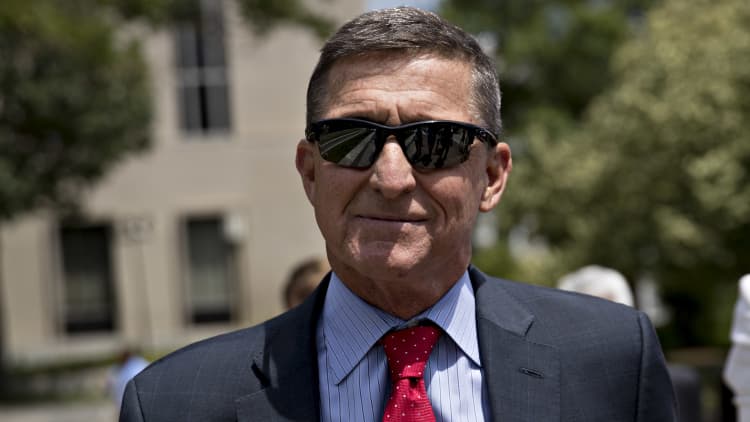A former federal prosecutor who quit the Justice Department in protest over its handling of Republican operative Roger Stone's criminal case in a scathing article Monday accused the department of a "betrayal of the rule of law" and Attorney General William Barr of "egregious" conduct by intervening in that case and the one of Michael Flynn, President Donald Trump's first national security advisor.
The ex-prosecutor, Jonathan Kravis, also warned that the Justice Department's intervention in the Stone and Flynn cases, "to protect an ally of the president ... betrays this principle" of a "commitment to equal justice under the law."
"I am convinced that the department's conduct in the Stone and Flynn cases will do lasting damage to the institution," Kravis wrote in an op-ed in The Washington Post.
Barr is head of the Justice Department. A spokeswoman for the attorney general did not immediately respond to a request for comment from CNBC.
Kravis' article came four days after Barr, in a stunning decision, approved the Justice Department's decision to ask a judge to dismiss the criminal case against Flynn, whose prosecution has been repeatedly criticized by Trump, as has Stone's.
A retired Army general who briefly served as Trump's first national security advisor, Flynn pleaded guilty in late 2017 to lying to FBI agents.
He had reaffirmed his guilt at a sentencing hearing a year later that was aborted to give him more time to cooperate with then-special counsel Robert Mueller.

In a filing Thursday, the interim U.S. attorney for the District of Columbia, former Barr advisor Timothy Shea, argued that the FBI's interview of Flynn was not justified by a counterintelligence investigation, and that his lies about what he said to a Russian diplomat were not "material" to that probe.
None of the career prosecutors who handled Flynn's case signed off on the dismissal request, which has yet to be approved by the judge in the case.
Kravis' op-ed also came three months after he resigned from the Justice Department, where he had worked for a decade.
"I left a job I loved because I believed the department had abandoned its responsibility to do justice in one of my cases, United States v. Roger Stone," Kravis wrote.
"At the time, I thought that the handling of the Stone case, with senior officials intervening to recommend a lower sentence for a longtime ally of President Trump, was a disastrous mistake that the department would not make again," he wrote.
"I was wrong."
In that case, Stone, who was a longtime friend of Trump, had been convicted at trial last fall of lying to Congress and witness tampering.
Kravis and three other trial prosecutors then recommended that Stone be sentenced to between seven and nine years in prison for his crimes.
But hours after they filed that recommendation, Trump called it "disgraceful" in a tweet.
The next day, in a move that had few if any precedents, Shea, with the approval of senior Justice Department officials, filed a new recommendation with the judge in Stone's case, saying that he deserved to be sentenced to "far less" time than what the career prosecutors had requested.
The three other prosecutors in addition to Kravis quit the case in apparent protest, although they stayed employed by the Justice Department. Stone ended up being sentenced to 40 months in prison, but remains free as he appeals his conviction and sentence.
Kravis wrote that in both Stone's and Flynn's cases "the department undercut the work of career employees to protect an ally of the president, an abdication of the commitment to equal justice under the law.
"Prosecutors must make decisions based on facts and law, not on the defendant's political connections. When the department takes steps that it would never take in any other case to protect an ally of the president, it betrays this principle."
Kravis also noted that in both cases, the Justice Department had assigned a special counsel, former FBI director Mueller, to handle both investigations, "precisely to avoid the appearance of political influence."
"For the attorney general now to directly intervene to benefit the president's associates makes this betrayal of the rule of law even more egregious," Kravis wrote.
The former prosecutor also blasted Barr for doing an interview on the heels of the decision to ask for a dismissal of Flynn's case.
In that interview, Kravis noted, Barr had said that the Stone prosecutors had lost their "perspective" in handling the case, and criticized the Flynn prosecutors for becoming "wedded to a particular outcome."
Kravis wrote that Barr knows that the career prosecutors whom he criticized are prohibited from speaking to the media without Justice Department approval, and thus "cannot respond" to the attorney general.
"Barr's decision to excuse himself from these obligations and attack his own silenced employees is alarming," Kravis wrote.
"It sends an unmistakable message to prosecutors and agents — if the president demands, we will throw you under the bus."
Kravis also scoffed at the idea that the Justice Department had acted in the cases of Stone and Flynn "because of good-faith commitments to legal positions."
"Where is the evidence of those commitments in other cases that do not involve friends of the president?," he wrote.
"Where are the narcotics cases in which the department has filed a sentencing memorandum overruling career prosecutors? Where are the other false-statements cases dismissed after a guilty plea?"
Kravis concluded his op-ed by saying he was writing it for the Justice Department's career agents and prosecutors, who will have, "the task of repairing this damage."
He wrote that their work already is hard, "and it becomes even harder when witnesses and jurors start to believe that the Justice Department's handling of these cases is infected by politics."
"Your service during these times is a credit to the department," Kravis wrote. "And you will be at your posts, serving justice, long after this attorney general is gone."


